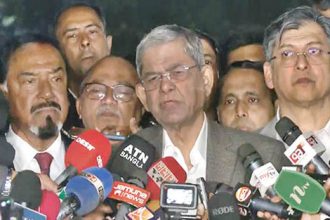By Somiron Mistry:
World climate change is created by Greenhouse gases (GHGs), particularly carbon dioxide (CO2) emissions, poses major threats to the environment and sustainability. I find the potential of economic growth, renewable energy application, and new innovation to achieve environmental sustainability by reducing CO2 emissions in Bangladesh.
Time series data from 1980 to 2019 were utilized by applying the autoregressive distributed lag (ARDL) bounds testing approach followed by the Dynamic Ordinary Least Squares (DOLS) method. The DOLS estimate findings show that the long-run coefficient of economic growth is positive and significant with CO2 emissions, indicating a 1% increase in economic growth is related to a 1.3% rise in CO2 emissions.
Furthermore, the coefficient of renewable energy use is negative and significant, which indicates that increasing renewable energy use by 1% is associated with CO2 emissions reduction by 0.15% in the long run.
- Advertisement -
In addition, the estimated long-run coefficient of technological innovation is negative but not significant, implying that a 1% increase in technological innovation results in a 0.07% reduction in CO2 emissions.
The empirical findings reveal that economic growth increases CO2 emissions in Bangladesh while increased renewable energy use and technological innovation help to achieve environmental sustainability by reducing CO2 emissions. The estimated results are robust to alternative estimators such as fully modified least squares (FMOLS) and canonical co-integrating regression (CCR).
In addition, the pairwise Granger causality test is utilized to capture the causal linkage between the variables. This article provides policy recommendations aimed at a low-carbon economy and promoting renewable energy use to achieve emission reduction and environmental sustainability in Bangladesh.
Bangladesh’s energy consumption is still dominated by high-carbon sources like natural gas, oil, and coal. An increase in renewable energy usage would have a long-term impact on CO2 emissions and industrialization. Bangladesh’s solar, hydro, wind, geothermal, and biomass energy resources can fully meet domestic energy demand.
As a result, Bangladesh could benefit from international technical assistance networks and a rapid expansion of renewable energy sources. The government could devise and implement effective policies to promote investment in new renewable energy technologies, thereby increasing renewable energy consumption.
- Advertisement -
For example, the government may invest in renewable energy projects through public-private partnerships. Renewable energy is abundant in Bangladesh, but promotion is hindered by higher costs. Bangladesh may develop policies to reduce the cost of renewable energy and discourage the use of fossil fuels in industries, businesses, and households.
Moreover, existing public education programs in Bangladesh on energy conservation and efficiency could be expanded. Regulatory policies may be established to promote renewable energy and environmental sustainability.
The authorities would also promote energy-efficient home appliances and more affordable renewable energy sources for the household sector.
I suggest that the policymakers in Bangladesh prepare an renewable energy policy that reduces CO2 emissions without affecting economic growth. To avoid pollution at the source, the “pollute first, then treat” strategy might be altered, and the economic development mode at the expense of the environment could be transformed.
- Advertisement -
In this regard, I recommend the government assist markets by building a robust legislative framework that generates long-term value for emission reductions and continually promotes innovative technologies that lead to an economy that is less carbon intensive. Our government may consider implementing carbon capture and storage technology to reduce CO2 emissions from fossil fuel use in power generation and industry.
Another suggestion is to re-examine current carbon tax laws while attempting to discover greener energy sources for Bangladesh’s transportation industry and metropolitan areas. Reduced use of natural gas, crude oil, diesel oil, kerosene, and coal can reduce CO2 emissions significantly.
Bangladesh needs to construct a strong environmental policy for all economic sectors, including industrial, leatherworking, chemical manufacturing, and shipbuilding, as a developing country. Lower carbon emissions rates for electricity generation in Bangladesh would result from technological advancements in renewable energy integration.
Thus, fostering the economic transition to renewables is critical for reducing the environmental pressures caused by economic development. Renewable energy companies and technology could also be encouraged and promoted by policymakers. By displacing CO2-intensive conventional energy sources, these measures will assist the economy in increasing the percentage of renewable energy consumption in overall energy consumption.
In addition, institutional alignment is required to encourage renewable energy consumption across economic activities and assure long-term economic growth. Finally, environmental laws must be strictly enforced. These will ensure that the country’s quest for rapid economic growth and transformation does not compromise environmental sustainability.
However, the impact of technological innovation to reduce CO2 emissions is still in its early stage in Bangladesh and will take time to show some more outstanding results in this regard.
New technologies must be developed through research and patent applications to soften the link between carbon emissions and environmental sustainability to achieve the emission reduction target.
Part of this endeavour is the development of technology that enables more efficient energy usage, and it will likely play a significant role in any future stabilization strategy. New technology, such as hybrid cars, provides substantial energy savings while maintaining the same level of service.
Energy-efficient air conditioning systems would save a lot of money while providing the same level of comfort. To encourage firms to develop low-carbon technology, the government may increase funding for businesses doing technological innovation research on energy conservation and emission reduction.
The writer is Executive Engineer, PWD, Dhaka, Bangladesh









